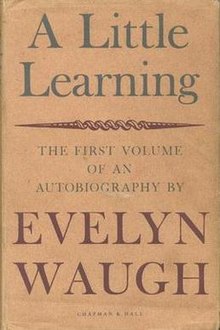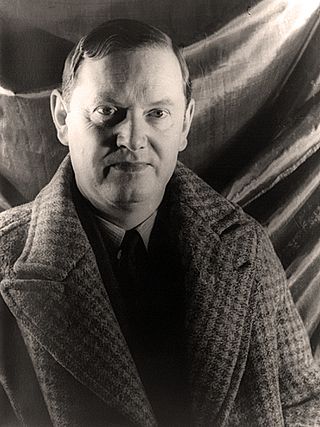
Arthur Evelyn St. John Waugh was an English writer of novels, biographies, and travel books; he was also a prolific journalist and book reviewer. His most famous works include the early satires Decline and Fall (1928) and A Handful of Dust (1934), the novel Brideshead Revisited (1945), and the Second World War trilogy Sword of Honour (1952–1961). He is recognised as one of the great prose stylists of the English language in the 20th century.

Alexander Raban Waugh was a British novelist, the elder brother of the better-known Evelyn Waugh, uncle of Auberon Waugh and son of Arthur Waugh, author, literary critic and publisher. His first wife was Barbara Jacobs, his second wife was Joan Chirnside and his third wife was Virginia Sorenson, author of the Newbery Medal-winning Miracles on Maple Hill.
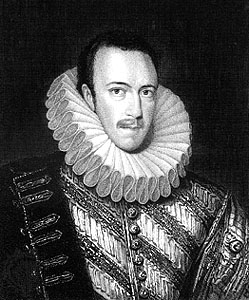
Philip Howard, 13th Earl of Arundel was an English nobleman. He was canonised by Pope Paul VI in 1970, as one of the Forty Martyrs of England and Wales. Howard lived mainly during the reign of Queen Elizabeth I; he was charged with being a Catholic, quitting England without leave, and sharing in Jesuit plots. For this, he was sent to the Tower of London in 1585. Howard spent ten years in the Tower, until his death from dysentery.

A Handful of Dust is a novel by the British writer Evelyn Waugh. First published in 1934, it is often grouped with the author's early, satirical comic novels for which he became famous in the pre–World War II years. Some commentators regard it as a transitional work due to its serious undertones, pointing towards Waugh's Catholic postwar fiction.
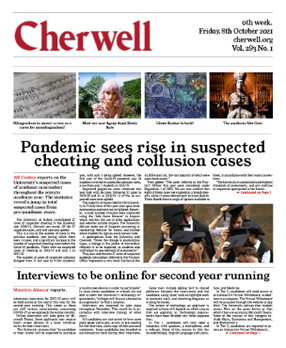
Cherwell is a weekly student newspaper published entirely by students of Oxford University. Founded in 1920 and named after a local river, Cherwell is a subsidiary of independent student publishing house Oxford Student Publications Ltd. Receiving no university funding, the newspaper is one of the oldest student publications in the UK.

Helena, published in 1950, is the sole historical novel of Evelyn Waugh.
Alfred Duggan was an Argentine-born English historian and archaeologist, and a well-known historical novelist in the 1950s. His novels are known for meticulous historical research.

The Ordeal of Gilbert Pinfold is a novel by the British writer Evelyn Waugh, first published in July 1957. It is Waugh's penultimate full-length work of fiction, which the author called his "mad book"—a largely autobiographical account of a period of hallucinations caused by bromide intoxication that he experienced in the early months of 1954, recounted through his protagonist Gilbert Pinfold.
Arthur Waugh was an English author, literary critic and publisher. He was the father of the authors Alec Waugh and Evelyn Waugh.
Alexander Evelyn Michael Waugh is an English writer, critic, and journalist. Among other books, he has written Fathers and Sons: The Autobiography of a Family (2004), about five generations of his own family, and The House of Wittgenstein: A Family at War (2008) about the Wittgenstein family. He is an advocate of the Oxfordian theory, which holds that Edward de Vere, 17th Earl of Oxford was the real author of the works of William Shakespeare.

The Temple at Thatch was an unpublished novel by the British author Evelyn Waugh, his first adult attempt at full-length fiction. He began writing it in 1924 at the end of his final year as an undergraduate at Hertford College, Oxford, and continued to work on it intermittently in the following 12 months. After his friend Harold Acton commented unfavourably on the draft in June 1925, Waugh burned the manuscript. In a fit of despondency from this and other personal disappointments he began a suicide attempt before experiencing what he termed "a sharp return to good sense".

Evelyn Waugh (1903–1966) was a British writer, journalist and reviewer, generally considered one of the leading English prose writers of the 20th century. The following lists his fiction, travel and biographical works, together with selected articles and reviews.

Charles Robert Mowbray Fraser Cruttwell was a British historian and academic who served as dean and later principal of Hertford College, Oxford. His field of expertise was modern European history, his most notable work being A History of the Great War, 1914–18. He is mainly remembered, however, for the vendetta pursued against him by the novelist Evelyn Waugh, in which Waugh showed his distaste for his former tutor by repeatedly using the name "Cruttwell" in his early novels and stories to depict a sequence of unsavoury or ridiculous characters. The prolonged minor humiliation thus inflicted may have contributed to Cruttwell's eventual mental breakdown.

Scott-King's Modern Europe, published in 1947, is a novella by Evelyn Waugh, sometimes called A Sojourn in Neutralia. It was first published in an abridged form in the Cornhill Magazine in 1947, and then by Chapman & Hall, also in 1947. The first American edition, by Little, Brown, appeared in 1949.
The Queen Anne Press is a small publisher.
A Little Learning may refer to:
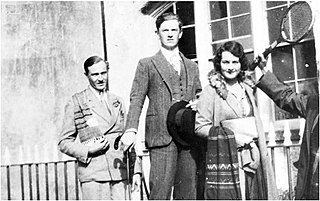
Alastair Hugh Graham was an honorary attaché in Athens and Cairo, an Oxford friend of Evelyn Waugh, and, according to Waugh's letters, one of his "romances". He is, together with Hugh Lygon and Stephen Tennant, considered the main inspiration for Sebastian Flyte in Brideshead Revisited.

Evelyn Florence Margaret Winifred Gardner was the youngest child of Herbert Gardner, 1st Baron Burghclere, and the first wife of Evelyn Waugh. She was one of the Bright Young Things.
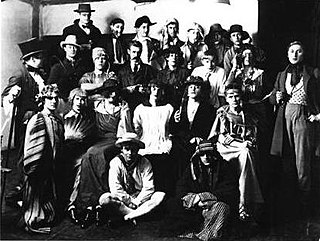
The Hypocrites' Club was one of the student clubs at Oxford University in England. Its motto in Greek, from an Olympian Ode by Pindar, was Water is best. This led to the members being called Hypocrites, due to the fact that beer, wine and spirits were the chosen drinks.
Piers Court is a country house in Stinchcombe on the Cotswold Edge in Gloucestershire, England. A Grade II* listed building, in the mid-20th century the court was home to the novelist Evelyn Waugh.
